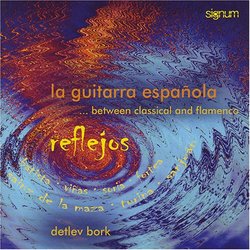| All Artists: Andres Batista, Jose Vinas, Luis Soria, Daniel Fortea, Regino Sainz de la Maza, Joaquin Turina, Pedro Sanjuan Title: Reflejos: La Guitarra espaņola Members Wishing: 0 Total Copies: 0 Label: Signum Original Release Date: 1/1/2006 Re-Release Date: 9/26/2006 Album Type: Import Genres: Dance & Electronic, International Music, Classical Styles: Chamber Music, Historical Periods, Classical (c.1770-1830), Instruments, Strings Number of Discs: 1 SwapaCD Credits: 1 UPCs: 675754938826, 4011254128002 |
Search - Andres Batista, Jose Vinas, Luis Soria :: Reflejos: La Guitarra espaņola
 | Andres Batista, Jose Vinas, Luis Soria Reflejos: La Guitarra espaņola Genres: Dance & Electronic, International Music, Classical
|
Larger Image |
CD Details |
CD ReviewsA New Look at the "Spanish guitar" David Norton | Utah | 07/02/2008 (5 out of 5 stars) "The German guitarist Detlev Bork seems equally at home in the classical or flamenco realms, no mean feat as both disciplines are highly demanding at the level where Bork is playing. His liner notes mention that there is a certain paradox found in the repertoires of most concert guitarists, in that while the guitar is widely associated with Spain, there is a near-pathological aversion by performers to programming most any sort of Spanish folkloric music. Segovia's quest to "free the guitar of flamenco associations" was clearly a double-edged sword, as this recording attests.
The first set is a group of three pieces by Andres Batista, dedicated to Bork. It is styled as "a synthesis of classical and flamenco music", and as hybrids go, it works rather well. This is followed with increasingly complex sets by Jose Vinas, Luis Soria, and Daniel Fortea. The playing is well-delivered, however the compositions themselves tend to be rather charming but ultimately unmemorable. With the next set, four pieces by Regino Sainz de la Maza, the writing quality goes up a few notches. Bork delivers a memorable "Solea", a lively "Alegria", then a tender "Cantilena" in the guitaristically remote key of B-major, and finally the lively "Zapateado". This last is one of Sainz de la Maza's "greatest hits", and for good reason. Many guitarists will be looking at this CD specifically for the next four selections. Tracks 16-17-18 give us the original manuscript version of three old favorites, Joaquin Turina's "Fandanguillo", "Rafaga", and "Fantasia-Sevillanas", all in their pre-Segovianized form. Of the three, "Rafaga" is the most significantly altered from what is traditionally heard, with a considerably stronger flamenco presence. The "Fantasia-Sevillanas" is done in an all-out flamenco style and is certainly the most exciting piece on the disc. By rights, Bork should be awarded both ears and a tail for this one. The final piece, presented as something of an encore, is really the Crown Jewel of the album. This is the premiere recording of Pedro Sanjuan's "Una Leyenda", one of the many pieces recovered from the Segovia Archive in 2001 and published by Editions Berben of Italy. Here we have a work written in 1923 which so clearly falls within the Segovian paradigm of "what classical guitar music should be", that it is nothing short of amazing the late maestro never adopted it. It is a tuneful serenade in d-minor, which clearly is in direct lineage with pieces like Albeniz's "Mallorca", Granados's "Danza Triste", and Tarrega's "Capricho Arabe". I make reference to these three stand-bys of the classical guitar repertoire to indicate what sort of mood is created by "Una Leyenda", what sort of metaphoric company it would keep. Had Segovia opted to perform/record this piece, there is no doubt at all in my mind that by now it would be firmly ensconced into the Standard Repertoire, and likely would have been residing there for several decades. So, in conclusion: a very fine CD by a strong and capable musician, which absolutely should be in the collection of any serious aficionado of either the guitar or of Spanish music." |

 Track Listings (19) - Disc #1
Track Listings (19) - Disc #1